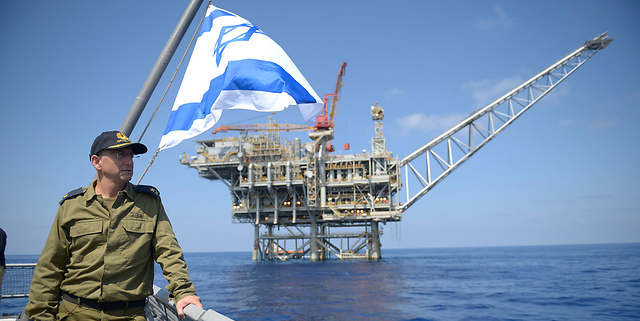
MEDITERRANEAN GAS FOR EUROPE

PENNENERGY - A potential undersea pipeline carrying natural gas from deposits in the eastern Mediterranean to Europe is "very realistic" and could help secure the continent's energy future, Israel's energy minister said Tuesday.
Yuval Steinitz said that a study on the "strategic" EastMed Pipeline Project shows that the pipeline is feasible, even though it presents technical challenges due to the depths involved.
He said the estimated 6.2 billion-euro ($7.36 billion) pipeline could take 6-7 years to build and that the countries involved in the project "are serious about it, it will happen."
The Israeli official said an undersea pipeline would be less vulnerable to sabotage and won't have to cross many national boarders to reach markets, making it a safer investment.
"This is one of the best projects," Steinitz told The Associated Press ahead of the signing of an agreement between Cyprus, Israel, Greece and Italy affirming their commitment to moving ahead with the project.
Steinitz said significant deposits already discovered in the east Mediterranean, including Israel's Leviathan field are "just the tip of the iceberg" and that "it's very likely" that more gas will be found in Cypriot waters.
He said an Israeli-commissioned study estimated that further exploration off Israeli waters could find more than three times the 1 trillion cubic meters (35.31 trillion cubic feet) of gas that's already been discovered.
Italian energy company Eni, along with France's Total and ExxonMobil are now searching hydrocarbons off Cyprus. Two years, ago, Eni discovered in Egyptian waters the biggest gas field ever found in the Mediterranean.
Steinitz told reporters after the signing of the agreement that apart from the EastMed pipeline, Israel is considering building direct pipelines to neighboring countries including Egypt and Turkey.
Greece's Energy Minister Georgios Stathakis called Tuesday's signing a "major step forward" on a project that Athens considers "strategically very important for Europe."
In a joint statement after the signing, the four countries said the project would "secure a direct long-term export route from Israel and Cyprus to Greece, Italy and other European markets," bolstering the European Union's security of supply and promoting competition among gas suppliers.
Cyprus' Energy Minister Yiorgos Lakkotrypis said the four countries are looking to sign an overarching deal incorporating all the technical and economic aspects of the project next year.
Elio Ruggeri, chief executive of IGI Poseidon which is heading the project, told The Associated Press that there's now an oversupply of gas to Europe which will keep prices low and forestall new investment in infrastructure.
But a projected rise in gas prices will make construction of the 2,000-kilometer (1,250-mile) pipeline viable by its 2025 scheduled completion.
The pipeline would start about 170 kilometers (105 miles) off Cyprus' southern coast and reach Otranto, Italy via Crete and the Greek mainland.
It will have the capacity to carry up to 20 billion cubic meters (706 billion cubic feet) of gas yearly. Europe's gas import needs are projected to increase by 100 billion cubic meters (3.5 billion cubic feet) annually by 2030.
-----
Earlier:

2016, September, 30, 18:35:00
AN IMPORTANT ISRAELI GASEurope sees Israel and the region as an important supplier of gas to Europe
|

2016, June, 20, 18:05:00
LEVIATHAN'S DEVELOPMENTAccording to a development plan approved this month by the energy ministry, Leviathan's three anchor customers for its phase 1 development are expected to be the domestic Israeli market, the Jordanian power company Nepco and the Egyptian consortium Dolphinus Holdings, which was supposed to purchase gas from Tamar last year in a deal that has not materialized.
|

2016, April, 26, 20:00:00
RUSSIA & ISRAEL GAS TALKSPutin's interest in Israeli gas is neither secret nor new. In 2012 Russia's Gazprom discussed the possible purchase of a 30% stake in Israel's offshore Leviathan gas field. In 2013 Gazprom signed a contract to purchase much of the Tamar gas field's production but the contract wasn’t approved by Israel's Energy Ministry.
|

2016, March, 29, 18:45:00
ISRAELI GAS DECISIONCritics said the deal gave too much profit to corporations at the public's expense. The court opposed a clause that would prevent Israel from making significant regulatory changes for the next ten years.
|

2016, March, 19, 19:00:00
ISRAEL & RUSSIA COLLABORATIONIsrael and Russia are about to agree upon a modus operandi in the East Mediterranean concerning weapons and natural gas deals, several Israeli media reports indicate. According to various assessments, the bottom line of such an agreement would be that Israel will not sell natural gas to Turkey and, in return, Russia won't supply S-300 anti-aircraft missiles and other advanced weapon systems to Iran and other regional enemies of Israel.
|

2015, May, 28, 18:40:00
ISRAEL'S GAS POLICYDiscoveries of natural gas offshore Israel signalled the eastern Mediterranean as a new frontier for the development of natural gas resources. The gas discoveries provide a unique opportunity for Israel to change its mentality vis-à-vis neighbouring countries and view the resources as a tool for strengthening regional cooperation and solidarity through energy diplomacy. While security concerns in Israel remain paramount, diplomacy in the context of the eastern Mediterranean transcends traditional foreign and security policy considerations, and attempts to use economic and commercial means to interlink the countries of the region through energy relations.
|

2014, October, 7, 19:55:00
ISRAEL: GAS IS A KEYAfter this summer’s war in Gaza battered Israel’s international reputation, the country’s leaders say they have a new foreign policy tool to build relations with its neighbors: natural gas. |









